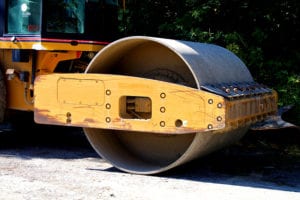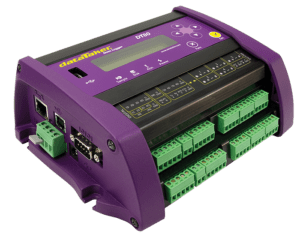dataTaker Records Data from Bitumen Spray Runs
CAS DataLoggers provided a comprehensive data logging solution for a company owning several bitumen spray trucks used to seal roads and highways. Management wanted to demonstrate the quality and efficiency of their process to customers by recording the specific information regarding their particular equipment during multiple bitumen spray runs. This road condition monitoring data would have to be collected from sensors recording several different parameters including the temperature of the bitumen, the surrounding air, engine RPM, road speed, and more.
 Installation
Installation
After contacting CAS DataLoggers, the company installed a dataTaker DT80 Intelligent Data Logger inside a protective enclosure placed within a truck cabin. All power and signal wires are routed into this enclosure through protective conduits. The DT80 is a small low-power data logger with 5-15 universal analog sensor inputs, 12 digital channels, and 4 high-speed dedicated counter channels. The device’s intelligent operation offers automated event-triggered logging along with a wide variety of programmable features. For the duration of the road condition monitoring project, the dataTaker DT80 logs without direct operation by the driver – instead, the data logging process is initiated by the same switch that the driver uses to begin spraying, and is stopped by the same switch used to stop spraying.
Versatile Sensor Connectivity
6 different sensor types are installed around the truck and are connected to the data logger as follows:
- Air Temperature Sensor – a Type K Thermocouple installed immediately below the truck’s exterior front cowling measures the air temperature at the start of each bitumen spraying run. This sensor is connected to the DT80’s Analog Channel 1.
- Bitumen Temperature Sensor – another Type K Thermocouple is installed in the bitumen tank, measuring the bitumen’s temperature at the start of each spraying run. This sensor is connected to the DT80’s analog channel 2.
- Spray Bar Pressure Sensor – This sensor is mounted in the spray bar at the rear of the truck and measures spray bar pressure every second during runs. The pressure sensor has a 4-20mA current loop output signal, representing 0 – 10 Bar or 0 – 1000 kPa of pressure. The sensor loop power is provided from the 24VDC truck battery and taken from the power supply input of the logger. The sensor is connected to the DT80’s analog channel 3.
- Bitumen Pump RPM – a digital pickup sensor mounted over a 60-tooth gear wheel located on the pump drive shaft. The sensor returns 60 pulses per revolution, and the pump RPM is measured every second during spray runs. RPM at the end each second is 1/60 * 60 = 1 RPM. This sensor is connected to the DT80’s high-speed counter channel 1.
- Engine RPM Sensor – a digital pickup sensor mounted over the 145-tooth ring gear in the bell housing at the rear of the engine. The engine RPM is also measured every second, and the sensor returns 145 pulses per revolution, so the RPM at the end of each second is 1/145 * 60 = 0.414 RPM. The sensor is connected to the DT80’s high-speed counter channel 2.
- Road Speed Sensor – a digital pickup sensor mounted over a gear wheel on the output shaft from the truck transmission gearbox. The sensor returns 23856 pulses for 100 meters of travel, i.e. each pulse represents 0.0042 meters of travel. This sensor is connected to the DT80’s high-speed counter channel 3.
The company has specifically programmed their dataTaker for the task, and the program is stored in the DT80’s non-volatile flash memory. When the logger is powered up directly from the truck’s 24VDC battery, the program executes automatically –the dataTaker never needs to be re-programmed unless changes are required. In this way, the data logger is permanently powered, and if a loss of power does occur, the program is protected in the non-volatile flash memory and any stored data is similarly protected. Meanwhile, the logger’s large memory stores up to 10 million points of data so that the company doesn’t need to purchase memory cards.
Controlling Data Logging
The logging of data from the sensors is controlled by the SPRAY ON and SPRAY OFF push buttons on the driver’s panel beside the steering wheel. This provides a safe voltage-free contact closure input to the data logger, which is normally closed. Pressing the SPRAY ON button activates the data logging relay and opens the contacts, and the SPRAY OFF button deactivates the data logging relay and closes the contacts. The voltage-free contact closure is input to the DT80’s digital channel 1.
Using counters, the DT80 logs both elapsed spray run time and the Run Number of sprays on each run. Each time the user presses the SPRAY ON button, the counter increments by 1. The Run Number is used in combination with the date to identify each run on each day of operation. Additionally, the Run Number counter is reset to 0 at midnight so that the first run each day is Run Number 1. Likewise, the Elapsed Spray Time counter is set to 0 when the user presses the SPRAY ON button and is incremented each second during a spray run. The Elapsed Spray Time is logged each second along with the sensor data for that second. At the end of the shift, all data stored on the dataTaker is downloaded via a USB stick to an office PC for analysis and archiving.
Benefits
The dataTaker DT80 recorded and stored all the necessary readings for the road condition monitoring project including temperature, 4-20 mA current, engine RPM and road speed—all without needing additional memory cards. This proved to be both cost-effective and convenient for the company. Afterward, it was easy for users to download all the data as a CSV file using the included dEX graphical interface software, allowing detailed analysis and presentation in Microsoft Excel. This project is currently ongoing and the company is looking at possibly replicating this system throughout its fleet.
For more information on the dataTaker DT80 Intelligent Data Logger, road condition monitoring or to find the ideal solution for your application-specific needs, contact a CAS DataLogger Application Specialist at (800) 956-4437 or request more information.

